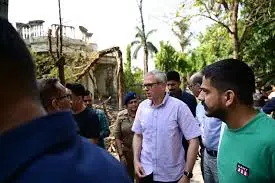Brotherhood among Hindus, Muslims, Sikhs commendable: On Poonch visit, Omar meets families ravaged by shelling

Poonch, J&K – May 13, 2025: Former Jammu and Kashmir Chief Minister Omar Abdullah on Monday visited the shelling-affected families in the border district of Poonch and highlighted the remarkable spirit of unity and resilience among people of different communities. In a region often scarred by cross-border tensions, the enduring brotherhood among Hindus, Muslims, and Sikhs stood out as a beacon of hope.
A Visit of Compassion and Concern
Omar Abdullah’s visit comes days after intense cross-border shelling in the Poonch sector led to civilian casualties and property destruction in several villages near the Line of Control (LoC). The National Conference (NC) leader met with families who had lost their loved ones or suffered injuries and offered condolences, calling the situation deeply tragic.
“These are not just numbers in a news report. These are real families—mothers, fathers, children—who are suffering in silence,” said Omar while speaking to the media. “I came here to express solidarity, but what struck me the most is the unbreakable bond among the people here, regardless of their religion.”
Communal Harmony Shines Through Crisis
Despite living under the constant shadow of conflict, the people of Poonch have shown an unwavering sense of unity. Residents, irrespective of faith, have stood shoulder to shoulder—offering shelter, sharing food, and tending to the injured.
“There’s no Hindu house or Muslim house here,” said Rajinder Singh, a local resident of Degwar village. “When the shells fall, we are all the same—just human beings trying to survive and protect each other.”
Another local, Zahida Bano, whose home was partially destroyed in the shelling, praised her Sikh neighbor for helping her family evacuate. “Our Gurmeet bhai came running. He helped my children get to safety. He didn’t see our religion, he only saw our fear.”
This spirit of communal harmony did not go unnoticed. Omar Abdullah specifically commended the unity, saying, “In times when divisive narratives dominate national headlines, the brotherhood in Poonch is a lesson in real nationalism and shared humanity.”
Demands for Rehabilitation and Safety
During his visit, Abdullah also urged the central and state governments to expedite rehabilitation efforts. He criticized the lack of long-term planning to safeguard civilian populations in border areas, who remain the most vulnerable during periods of cross-border hostilities.
“It’s unacceptable that after so many years of conflict, we still don’t have robust civilian bunkers, medical facilities, or long-term resettlement options for these residents,” said Omar. “They live every day in fear, and their children grow up amidst the echoes of gunfire.”
Local residents echoed similar concerns, requesting the government to focus not just on strategic defense but also on civilian security. Many families lamented that promises made after previous incidents have yet to be fulfilled.
“We don’t want more visits and assurances,” said Abdul Hamid, a retired teacher. “We want peace. And if peace is not possible, at least give us safety. Let our children live without fear.”
A Border Town That Refuses to Break
Poonch, known for its historical significance and ethnic diversity, has witnessed decades of conflict due to its proximity to the LoC. Yet, its communities have remained deeply intertwined through trade, marriage, and shared culture. Local festivals are celebrated together, and mutual respect still thrives despite external tensions.
“This region is proof that peace is possible,” Omar remarked during his interaction with civil society groups. “If Delhi and Islamabad take even a fraction of inspiration from the people of Poonch, the subcontinent could look very different.”
He also appealed to all political parties to refrain from using the pain of border residents for electoral gains. “Let us not forget that while we debate policies in TV studios, it is these people who pay the real price. Their dignity, unity, and suffering must not be politicized.”
Appeal for Dialogue and Diplomacy
Concluding his visit, Omar once again urged the Indian government to engage diplomatically with Pakistan to reduce border tensions. “War and escalation have no winners. Only ordinary citizens lose. Dialogue, however difficult, is the only sustainable solution.”
While such a call may seem idealistic to some, for the people of Poonch, it is a plea for survival.






